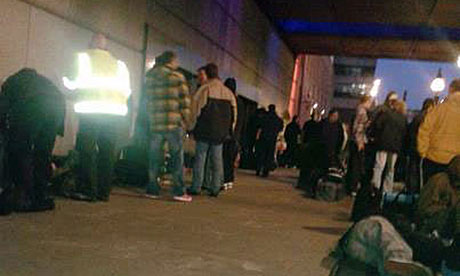They have no foresight, no hindsight, and little humanity. Are they really the best people to lead us out of this crisis?

The unemployed people bussed in to work as stewards at the jubilee – a sign of the scale of inequality in the west? Photograph: Shiv Malik for the Guardian
It's the economists, stupid! While we were not waving but drowning in soggy flags, economic stuff was happening. Big stuff, though it could not break through the gooey queen-fest. In the news blackout that was the jubilee, other countries were reporting the meltdown of the Spanish banks, and thus, eventually, the euro. Obama was on the phone to Cameron telling him to do something about Merkel. It's all pretty dire. It must be for me to understand it, for though I am not an economist, I know what I like. Some sort of stimulus, please. Fiscal will do nicely.
Actually, that may happen. Another £50bn could be pumped into the economy soon. Money does not grow on trees, you know. Except when it is called quantitative easing.
Why all this panic, though? Aren't economists in charge of it all? Yes. And this is the problem. These highly skilled people carry on, though they exhibit not only a lack of foresight but an astonishing lack of hindsight. Why on earth are they taken seriously when they keep getting things wrong? We are silenced by some jargon and bogus maths (sorry, probabilities) because we are mostly innumerate and because economic orthodoxy presents itself as a higher faith. I am not the only person uncertain as to what a trillion means, surely? It was explained to me in terms of time. A million is a few seconds, a trillion is 30 years – it's a lot of wonga.
The sudden ability to produce money out of thin air is exactly why economists such as Paul Krugman tell us that the Thatcher-lite hausfrau-speak of Osborne is senseless. The deficit is not like household debt, because if it was, I could go mad in Morrisons, go to the till promising to pay later and they would still give me cashback.
But we are indeed in reduced circumstances when debate is reduced to bankers arguing with economists. This clash of ideologies is not really left versus right. It is more akin to fundamentalists talking to agnostics. To be an austerity groupie, one has to ignore the actual behaviour of people; to believe fervently in Keynes, one has to ignore the behaviour of politicians.
Economics is not a science; it's not even a social science. It is an antisocial theory. It assumes behaviour is rational. It cannot calculate for contradiction, culture, altruism, fear, greed, love or humanity at all.
Sure, there are some new radicals on the block who daringly suggest that we should not adhere to the old models. We end up then with these money wizards shouting at each other on Newsnight while novelists such as John Lanchester translate for us. Only non-economists properly explain that money is not real and what was traded during the boom years were not real things, not even real futures, but guesstimates of futures bundled into some bizarre equation where no one at the top could lose. Gamblers always made money, but it became possible to make money without risking your own. It was risk, not wealth, that trickled down, so those without jobs could buy houses soon to be repossessed.
Risk-free capitalism was what the anti-globalisers always warned us about, but they had dreadlocks and dogs on string and were pepper-sprayed away. What they misjudged was how quickly developed countries would come to look like underdeveloped ones: the scale of inequality in "the west". In the US there are the incredibly wealthy and then those who sleep in the woods on the edge of broken cities; here, the unemployed are bussed in to "steward" the celebration of the billionaire monarch.
This is economic sense as it is practised by the deliberately dumb, those who bow down before the calculation that we can have even Spanish levels of youth unemployment (40%-50%) if it reduces the deficit by the next election. Meanwhile, if you have a job, do save up for your pension, because they have gone down the pan.
Do not complain either when economists and government ministers tell you that what you thought had a social purpose must now be profit-driven. Money must be made from schools, hospitals and looking after the elderly. The privatisation of care is one of the only growth industries. This is what you get from this dictatorship of economists, and it should be overthrown. It is wrong and keeps being wrong. The choices to be made now are moral, not economic ones. Only an idiot or an economist would think otherwise.

No comments:
Post a Comment